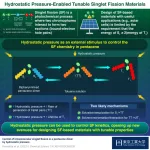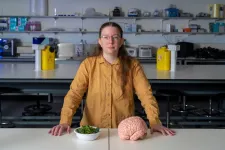(Press-News.org) UC Riverside scientists have significantly advanced the race to control plant responses to temperature on a rapidly warming planet. Key to this breakthrough is miRNA, a molecule nearly 200,000 times smaller than the width of a human hair.
With moderate increases in temperature, plants grow taller to avoid hotter ground and get fresher air. A landmark study published in the journal Nature Communications demonstrates that microRNA or miRNA is required for this growth. The study also identifies which miRNA molecules — out of more than 100 possibilities — are the essential ones.
“We found that without miRNA plants will not grow, even if we raise temperatures, even in the presence of added growth hormones,” said UCR botany professor and study co-author Meng Chen.
RNA is a nucleic acid present in all living cells, and its role is to act as a messenger carrying instructions from a cell’s DNA for creating a variety of proteins. MicroRNA is also necessary for healthy development in biological cells. It is created to bind to a specific RNA target and prevent that target from creating what it was designed to manufacture.
“MiRNA inhibits the production of its target RNA by inducing a cleavage in its target, or by inhibiting its target RNA from translating into another protein,” said UCR botany professor and study co-author Xuemei Chen.
Xuemei Chen’s lab at UCR helped discover miRNA in plants. Meng Chen’s laboratory previously identified components involved in the early stages of plants’ temperature sensitivity. The two groups of scientists joined forces to learn whether miRNA, which is so significant in other life forms, also plays a role in plants’ temperature responses.
For this test, the scientists only looked at mild increases in temperature, from 21 to 27 degrees Celsius. For reference, room temperature averages about 20 C. “We didn’t look at stress responses. We wanted to study temperature sensing without raising it to a level that would kill the plants,” Meng Chen said.
The researchers took Arabidopsis, a small flowering plant related to mustard and cabbage, and studied mutant forms with very low levels of miRNA. Without the miRNA, the mutant Arabidopsis could not respond to the change in temperature by growing as it should have.
Then they did a genetics experiment. “We asked whether we could make additional mutations on the mutant Arabidopsis deficient in making miRNAs and restore their ability to sense temperature,” Xuemei Chen said. The second experiment worked, “perfectly,” she said, and it revealed a gene responsible for restoring miRNA levels as well as the plant’s heat sensing abilities.
Next, the team faced a challenge in searching for the precise miRNA involved in temperature response. Arabidopsis manufactures 140 miRNA molecules. The scientists assumed levels of the responsible molecules would increase as temperatures did, but it didn’t happen that way.
Recalling that miRNA binds to and shuts down target RNA molecules, the team instead looked at target RNA molecule levels that were different in the original mutant Arabidopsis plant and in the second mutant plant they created.
“Looking at this we found the targets of 14 miRNA changed, and alongside the targets, we also found the miRNA,” Xuemei Chen said.
Having identified the right miRNA molecules, the team finally put together a comprehensive picture of temperature response. It involves two essential parts: molecules that sense temperature, and auxin, a hormone that allows a response to what’s been sensed by promoting plant growth.
“In between the sensor and the responder is miRNA. Without it, plants can sense heat but cannot respond to it by growing. It is a gatekeeper that can shut down — or allow — plants to deal with environmental temperature changes,” Meng Chen said.
During their experiments, the team found the miRNA is also required for plants’ response to reflected shade from neighboring plants.
“Our discovery connected the dots between three elements found in all plants that are key for plant responses to their environments,” Meng Chen said. “This includes sensors that monitor temperature and light changes, hormones that drive plant growth, and miRNA that controls plant development.”
The researchers hope their findings can be used to increase crop yields as the climate changes.
“The potential is that we use this to manipulate plant responses to local temperature and light conditions and control their growth in diverse environments,” Meng Chen said.
END
Without this, plants cannot respond to temperature
The tiny key to a major goal: maximizing crop growth
2023-03-23
ELSE PRESS RELEASES FROM THIS DATE:
Use of melatonin linked to decreased self-harm in young people
2023-03-23
Medical sleep treatment may reduce self-harm in young people with anxiety and depression, an observational study from Karolinska Institutet in Sweden suggests. The risk of self-harm increased in the months preceding melatonin prescription and decreased thereafter, especially in girls. The study is published in The Journal of Child Psychology and Psychiatry.
Melatonin is a hormone that controls the sleep-wake cycle and is the most commonly prescribed drug for sleep disturbances in children and adolescents in Sweden. Melatonin use has dramatically increased in recent years, and it is available over the counter in Sweden since 2020.
“Given the established link between sleep ...
Pressure-based control enables tunable singlet fission materials for efficient photoconversion
2023-03-23
Applying hydrostatic pressure as an external stimulus, Tokyo Tech and Keio University researchers demonstrate a new way to regulate singlet fission (SF), a process in which two electrons are generated from a single photon, in chromophores, opening doors to the design of SF-based materials with enhanced (photo)energy conversion. Their method overrides the strict requirements that limit the molecular design of such materials by realizing an alternative control strategy.
Singlet fission (SF) is a process in which ...
New wood-based technology removes 80% of dye pollutants in wastewater
2023-03-23
Researchers at Chalmers University of Technology, Sweden, have developed a new method that can easily purify contaminated water using a cellulose-based material. This discovery could have implications for countries with poor water treatment technologies and combat the widespread problem of toxic dye discharge from the textile industry.
Clean water is a prerequisite for our health and living environment, but far from a given for everyone. According to the World Health Organization, WHO, there are currently over two billion people living with limited or no access to clean water.
This global challenge ...
Optical switching at record speeds opens door for ultrafast, light-based electronics and computers
2023-03-23
Imagine a home computer operating 1 million times faster than the most expensive hardware on the market. Now, imagine that level of computing power as the industry standard. University of Arizona researchers hope to pave the way for that reality using light-based optical computing, a marked improvement from the semiconductor-based transistors that currently run the world.
"Semiconductor-based transistors are in all of the electronics that we use today," said Mohammed Hassan, assistant professor of physics and optical sciences. "They're part of every industry – from kids' toys to ...
Depressed, and aging fast
2023-03-23
Older adults with depression are actually aging faster than their peers, UConn Center on Aging researchers report.
“These patients show evidence of accelerated biological aging, and poor physical and brain health,” which are the main drivers of this association, says Breno Diniz, a UConn School of Medicine geriatric psychiatrist and author of the study, which appears in Nature Mental Health on March 22.
Diniz and colleagues from several other institutions looked at 426 people with late-in-life ...
Study finds “considerable uncertainty” around effectiveness and safety of analgesics for low back pain
2023-03-23
Despite nearly 60 years of research, there is still a lack of high certainty evidence on the effectiveness and safety of commonly used painkillers (analgesics) for short bouts of low back pain, finds an analysis of the evidence published by The BMJ.
The researchers say that until higher quality trials comparing analgesics with each other are published, “clinicians and patients are advised to take a cautious approach to manage acute non-specific low back pain with analgesic medicines.”
Analgesics such as paracetamol, ibuprofen, and codeine ...
Ending GP performance pay in Scotland linked to decline in quality of some care
2023-03-23
Ending performance related payments for NHS GPs in Scotland was associated with a decline in the quality of some aspects of care compared with England where financial incentives have continued, finds a study published by The BMJ today.
The researchers say further research is needed to better understand the full impact of withdrawal and the accompanying refocusing of quality improvement resources.
The NHS Quality and Outcomes Framework (QOF) pay-for-performance scheme began in 2004. It was designed to remunerate general practices for providing good quality care across a range of key areas such as cancer, diabetes, heart disease, mental health, and obesity.
In 2016, Scotland abolished ...
CHOP researchers develop first-of-its-kind prediction model for newborn seizures
2023-03-23
Philadelphia, March 22, 2023 – Researchers from the Neuroscience Center at Children’s Hospital of Philadelphia (CHOP) have developed a prediction model that determines which newborn babies are likely to experience seizures in the Neonatal Intensive Care Unit (NICU). This model could be incorporated into routine care to help the clinical team decide which babies will need electroencephalograms (EEGs) and which babies can be safely managed in the Neonatal Care Unit without monitoring through EEGs. This would allow families and providers to care for babies ...
A higher dose of magnesium each day keeps dementia at bay
2023-03-23
More magnesium in our daily diet leads to better brain health as we age, according to scientists from the Neuroimaging and Brain Lab at The Australian National University (ANU).
The researchers say increased intake of magnesium-rich foods such as spinach and nuts could also help reduce the risk of dementia, which is the second leading cause of death in Australia and the seventh biggest killer globally.
The study of more than 6,000 cognitively healthy participants in the United Kingdom aged 40 to 73 found ...
2022 heatwave struck off surgery in fifth of UK hospitals
2023-03-23
The 2022 summer heatwave resulted in a fifth of UK hospitals being forced to cancel operations during the three days when temperatures soared, a new study reveals.
Had the high temperatures continued, a further third of hospitals would have had to cancel surgery, as NHS buildings are not set up to withstand dangerously high temperatures.
The team surveyed surgeons, anaesthetists, and critical care doctors working during the heatwave of 16 – 19 July 2022.
They received 271 responses from 140 UK hospitals with one in five ...
LAST 30 PRESS RELEASES:
Ketamine high NOT related to treatment success for people with alcohol problems, study finds
1 in 6 Medicare beneficiaries depend on telehealth for key medical care
Maps can encourage home radon testing in the right settings
Exploring the link between hearing loss and cognitive decline
Machine learning tool can predict serious transplant complications months earlier
Prevalence of over-the-counter and prescription medication use in the US
US child mental health care need, unmet needs, and difficulty accessing services
Incidental rotator cuff abnormalities on magnetic resonance imaging
Sensing local fibers in pancreatic tumors, cancer cells ‘choose’ to either grow or tolerate treatment
Barriers to mental health care leave many children behind, new data cautions
Cancer and inflammation: immunologic interplay, translational advances, and clinical strategies
Bioactive polyphenolic compounds and in vitro anti-degenerative property-based pharmacological propensities of some promising germplasms of Amaranthus hypochondriacus L.
AI-powered companionship: PolyU interfaculty scholar harnesses music and empathetic speech in robots to combat loneliness
Antarctica sits above Earth’s strongest “gravity hole.” Now we know how it got that way
Haircare products made with botanicals protects strands, adds shine
Enhanced pulmonary nodule detection and classification using artificial intelligence on LIDC-IDRI data
Using NBA, study finds that pay differences among top performers can erode cooperation
Korea University, Stanford University, and IESGA launch Water Sustainability Index to combat ESG greenwashing
Molecular glue discovery: large scale instead of lucky strike
Insulin resistance predictor highlights cancer connection
Explaining next-generation solar cells
Slippery ions create a smoother path to blue energy
Magnetic resonance imaging opens the door to better treatments for underdiagnosed atypical Parkinsonisms
National poll finds gaps in community preparedness for teen cardiac emergencies
One strategy to block both drug-resistant bacteria and influenza: new broad-spectrum infection prevention approach validated
Survey: 3 in 4 skip physical therapy homework, stunting progress
College students who spend hours on social media are more likely to be lonely – national US study
Evidence behind intermittent fasting for weight loss fails to match hype
How AI tools like DeepSeek are transforming emotional and mental health care of Chinese youth
Study finds link between sugary drinks and anxiety in young people
[Press-News.org] Without this, plants cannot respond to temperatureThe tiny key to a major goal: maximizing crop growth



